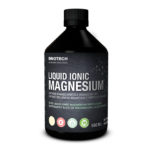
Liquid Ionic Magnesium
-CONTAINS CHARGED PARTICLE MAGNESIUM IONS-
Keep calm and reduce your stress with Liquid Ionic Magnesium. Magnesium is important for over 300 enzyme reactions in the body. Magnesium helps with stress and anxiety related to addictions. This mineral has a calming effect on the central nervous system, the muscles, mind and nerves.
Our very successful and effective formula is based on ionic and homeopathic sciences and because of this it is hard to compare with other magnesium supplements. Products with more magnesium per serving do not typically translate to larger absorption rates. Ionic nano-particle size Magnesium is easily absorbed. The reason this product works so well is because of the small particle size (500-1000 Nanometers) and the electrical charge of the magnesium ions that allow for the superior absorption through the ion channels in the mucus membranes, thus bypassing the digestive system. Cellular up-take is what really counts.
Why is there only 25 mg of Magnesium per serving?
Typically absorption of minerals like magnesium is around 5%. If you consume 350mg of Magnesium and only absorb 5%, this would equate to 17.5mg of Magnesium. Absorption depends on the ability of the stomach to ionize magnesium which degreases with age. Liquid Ionic Magnesium is absorbed in the mouth and stomach. It bypasses the digestive process where most other Magnesium products fail. 25mg of Liquid Ionic Magnesium works wonders for those deficient in magnesium (70-80% of the population).
Recommended Purpose:
- Helps in the development and maintenance of bones and teeth
- Helps in tissue formation. Helps to maintain proper muscle function
- Helps in the development and maintenance of bones, cartilage, teeth and gums
- Helps in connective tissue formation
- Helps in wound healing
- Anxiety
- Stress
Well Known Uses For Ionic Magnesium:
- Nervousness
- Substance Use Disorders
- Relaxation
- Muscle Cramps
- Mental Acuity
- PMS
- CFS (Chronic Fatigue Syndrome)
- Sleep issues
- Inflammation
- Migraines
- Depression
- Heavy Metal Poisoning
- High Blood Pressure
- High Cholesterol
Recommended Dose (adults): Take 1 oz.(30ml) per day or amount recommended by a health care practitioner. For best freshness, use within 2 months after opening container.
Magnesium deficiency triggers or causes
the following conditions
The only contraindications to magnesium are caused in people with outright kidney failure, bowel obstruction, Myasthenia gravis, or heart block. Also, if you have a heart condition you may find that taking magnesium can lessen the need for heart medication and you should be under doctor’s supervision to guide this process.
Anxiety and Panic attacks: Magnesium (Mg) normally keeps adrenal stress hormones under control.
Asthma: Both histamine production and bronchial spasms increase with Mg deficiency.
Blood clots: Mg has an important role to play in preventing blood clots and keeping the blood thin-much like aspirin but without the side effects.
Bowel disease: Mg deficiency slows down the bowel causing constipation, which could lead to toxicity and malabsorption of nutrients, as well as colitis.
Cystitis: Bladder spasms are worsened by Mg deficiency.
Depression: Serotonin, which elevates moods, is dependent on Mg. A Mg-deficient brain is also more susceptible to allergens, foreign substances that can cause symptoms similar to mental illness.
Detoxification: Detoxification – Mg deficiency impairs the detoxification pathways crucila for the removal of toxic substances and heavy metals such as aluminum and lead.
Diabetes: Mg enhances insulin secretion, facilitating sugar metabolism. Without Mg insulin is not able to transfer glucose into cells. Glucose and insulin build up in the blood causing various types of tissue damage.
Fatigue: Mg-deficient patients commonly experience fatigue because dozens of enzyme systems are under-functioning. An early symptom of Mg deficiency is frequently fatigue.
Heart disease: Mg deficiency is common in people with heart disease. Mg is administered in hospitals for acute myocardial infarction and cardiac arrhythmia. Like any other muscle, the heart muscle requires Mg. Mg is also used to treat angina, or chest pain.
Hypertension: With insufficient Mg, spasm of blood vessels and high cholesterol occur, both of which lead to blood pressure problems.
Hypoglycemia: Mg keeps insulin under control; without Mg episodes of low blood sugar can result.
Insomnia: Sleep-regulating melatonin production is disturbed without sufficient Mg.
Kidney Disease: Mg deficiency contributes to atherosclerotic kidney failure. Mg deficiency creates abnormal lipid levels and worsening blood sugar control in kidney transplant patients.
Liver Disease: leading to liver failure- Mg deficiency commonly occurs during liver transplantation.
Migraine: Serotonin balance is Mg-dependent. Deficiency of serotonin can result in migraine headaches and depression.
Musculoskeletal conditions: Fibrositis, fibromyalgia, muscle spasms, eye twitches, cramps and chronic neck and back pain may be caused by Mg deficiency and can be relieved with Mg supplements.
Nerve problems: Mg alleviates peripheral nerve disturbances throughout the whole body, such as migraines, muscle contractions, gastrointestinal spasms, and calf, foot and toe cramps. It is also used in treating central nervous symptoms of vertigo and confusion.
Obstetrics and Gynecology:
Mg prevents Premenstrual Syndrome; prevents dysmenorrhea (cramping pain during menses); is important in the treatment of infertility; and alleviates premature contractions, preeclampsia, and eclampsia in pregnancy.
Intravenous Mg is given in obstetrical wards for pregnancy-induced hypertension and to lessen the risk of cerebral palsy and Sudden Infant Death Syndrome (SIDS). Mg should be a required supplement for pregnant mothers.
Osteoporosis: Use of calcium with Vitamin D to enhance calcium absorption without a balancing amount of Mg causes further Mg deficiency, which triggers a cascade of events leading to bone loss.
Raynaud’s Syndrome: Mg helps relax the spastic blood vessels that cause pain and numbness of the fingers.
Tooth decay: Mg deficiency causes an unhealthy balance of phosphorus and calcium in saliva, which damages teeth.

